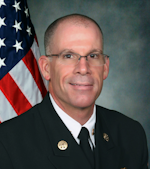As Firehouse Sees It: Professionals Don’t Dismiss Critics
As firefighters and fire officers, we operate in an environment in which our every action is on display to the general public and those we serve. And while few outside our ranks may fully understand why we do what we do, not a day has passed where a “keyboard tactician” or less-trained critic did not take the time to opine on our performance. Add the power of social media and cell phone cameras, and the probability of criticism rises exponentially.
One year after leaving office, former President Theodore Roosevelt delivered what has become his most quoted speech, “Citizenship in a Republic” (aka “The Man in the Arena”), offering his renowned advice for dealing with critics: “It is not the critic who counts; not the man who points out how the strong man stumbles, or where the doer of deeds could have done them better. The credit belongs to the man who is actually in the arena, whose face is marred by dust and sweat and blood; who strives valiantly; who errs, and comes short again and again, because there is no effort without error and shortcoming; but who does actually strive to do the deeds; who knows the great enthusiasms, the great devotions; who spends himself in a worthy cause; who at the best knows in the end the triumph of high achievement, and who at the worst, if he fails, at least fails while daring greatly, so that his place shall never be with those cold and timid souls who know neither victory nor defeat.”
Roosevelt’s words have inspired men and women of all walks of life to take risks, to push themselves beyond their comfort zones and to look beyond the criticisms that often follow failure and/or defeat. But as public servants, it’s important that we understand that while we may at times be encouraged to look beyond criticisms, we must remain humble and open-minded to those who challenge us to justify our actions and/or improve our performance.
It has been suggested by some that unless you’ve crawled down a smoke-filled hallway, ascended the rungs of an aerial ladder to vent a roof, or shouldered the weight of responsibility imposed by commanding a multi-alarm incident, you have no “skin in the game”; you have no right to criticize or question those who operate on the front lines. Nothing could be further from the truth.
To suggest that we can or should blindly dismiss the criticisms of politicians, the challenges of our operations imposed by taxpayers, the empirical findings of a researcher, or the suggested best practices of a suit-wearing safety professional is extremely short-sighted and ill-advised. Politicians, taxpayers, researchers and, yes, suit-wearing professionals have a vested interest in what we do and how we do it. Their opinions matter, and we need to be open-minded and listen.
At a recent multi-alarm fire, an elected official publicly criticized the fire chief over what he felt was a less-than-aggressive effort by those operating on the scene. The official shared his criticism toward the chief on the scene of the incident while crews were still attempting to bring the blaze under control. The official’s actions made headlines, and he received scrutiny from his colleagues, local citizens and firefighters around the world. To be clear, this official had every right to offer his criticism and challenge the operations of the fire department. After all, he represents the taxpayers of his district, and it is his responsibility to ensure they are provided the best possible service given the resources provided. That being said, during an active fire scene is neither the time nor the place for this type of criticism.
As firefighters and fire officers, we are expected to know our jobs and to perform our duties in compliance with national standards and best practices, but we should never fall victim to the assumption that we are all knowing and without fault. We ARE professionals and we improve our actions by being critical of our performance EVERY TIME. When challenged by those within and/or outside our ranks, we justify our actions with factual data; we base our remarks on quantifiable statistics and best practices and, like true professionals, we NEVER dismiss an opportunity to improve our performance.

Timothy E. Sendelbach | Editor-in-Chief
Timothy E. Sendelbach is a 30-year student and educator of the fire and emergency services, and former editor-in-chief for Firehouse. He has served as an assistant fire chief with the North Las Vegas, NV, Fire Department, as the chief of training for Savannah (GA) Fire & Emergency Services and as assistant fire chief for Missouri City, TX, Fire & Rescue Services. He is a credentialed Chief Fire Officer and Chief Training Officer and has earned a master’s degree in leadership from Bellevue University, bachelor’s degrees in fire administration and arson and an associate’s degree in emergency medical care from Eastern Kentucky University.






